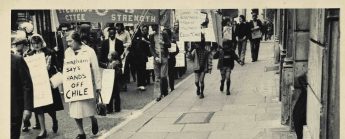There is plenty to admire in The History Manifesto. In our uncertain times, Guldi and Armitage’s call for historians to ‘speak truth to power’ and intervene in public debates about society, the economy, and the environment, is both an ethical and a political imperative. While few would disagree with this, the Manifesto’s vision of the historian, and the publics we write with, from, and for, is troublingly narrow and exclusive.
Many readers of the Manifesto will be surprised by the dismissive caricature of ‘micro-historians’ like Natalie Zemon Davis – such a radical political voice – as somehow disengaged from vital questions of power and inequality. Historians will also be surprised to learn that they have stopped engaging in debates about the past and our contemporary world. The historian’s public role remains a powerful ideal. In Britain, at least, the insistence on reaching out is embedded in the institutional and financial structures within which we work. Buzzwords like ‘public engagement’ and ‘knowledge transfer’ can be problematic, but draw attention to how seriously academic historians take their public role. The Research Excellence Framework might be an inventory of narrowing specialism, but it is also a census of the imaginative ways in which historians are talking to, and learning from, communities more expansive than the small ‘public’ envisaged by Guldi and Armitage.
Learning from – that phrase should matter in a truly radical manifesto. ‘The public future of the past remains in the hands of historians,’ argues the Manifesto. This is a privileged vision of the historian as authority, marshalling their ‘big data’ and assembling the ‘fragments’ of archival research produced by more junior colleagues, before venturing out of their study to bend the ear of politicians, policy-makers, and corporations. Guldi and Armitage present the public as an anonymous mass to address – to put right about the ‘truth’ of the past – rather than a creative democratic citizenry from whom we can learn. ‘If history was thought of as an activity rather than a profession’, notes the historian Raphael Samuel, ‘then the number of its practitioners would be legion’. History is a common project, and the public future of the past is in the hands of all of its practitioners.


One thought on “Matt Houlbrook, ‘Big histories, small minds’”